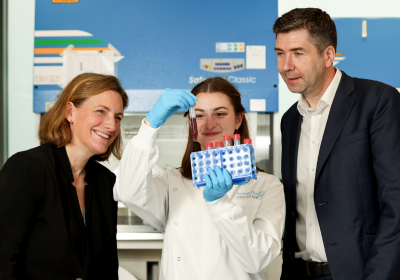 New research by Prof Breandán Kennedy, Kayleigh Slater and collaborators has investigated the disease relevance and therapeutic potential of cysteinyl leukotriene receptors in uveal melanoma (UM), a rare eye cancer that often spreads to the liver. Unfortunately, there are no therapies available to stop the spread of UM and patients are often faced with an extremely poor prognosis.
New research by Prof Breandán Kennedy, Kayleigh Slater and collaborators has investigated the disease relevance and therapeutic potential of cysteinyl leukotriene receptors in uveal melanoma (UM), a rare eye cancer that often spreads to the liver. Unfortunately, there are no therapies available to stop the spread of UM and patients are often faced with an extremely poor prognosis.
This group assessed whether the cysteinyl leukotriene receptors (CysLT1 and CysLT2) are relevant to the progression of UM. Using UM patient samples, they discovered that increased levels of CysLT1 in tumours is associated with reduced patient survival. Using UM cell lines and zebrafish models, they found that drugs targeting CysLT1, but not CysLT2, can alter hallmarks of cancer including cell growth, proliferation, and metabolism.
This study is the first to examine the relationship of the CysLT receptors with clinical features of UM. This data strengthens the importance of CysLT signalling in UM and suggest that antagonism of CysLT1 may be of therapeutic interest in the disease.
This study was funded by the Irish Research Council Employment Based Postgraduate Scholarship (EBP/2017/473) (KS), a British Pharmacological Society Schachter Award (KS) and Breakthrough Cancer Research (KS and BNK).
https://www.mdpi.com/2072-6694/12/10/2950
Donate Now












 Contact
Contact